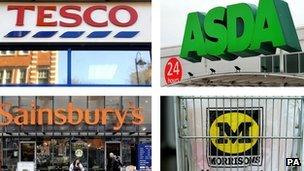Supermarket price war: Can they all be cheapest?
- Published

Tesco promises to give you vouchers if your shopping is more expensive than it would have been at Asda and you use its Price Check application online.
Sainsbury's automatically gives you vouchers at the till if any branded goods you've bought would have been cheaper at Tesco or Asda.
Asda will give you vouchers if your shopping is not 10% cheaper than Tesco, Asda or Morrisons and you use its Price Guarantee application online.
But they can't all be the cheapest, can they?
Remarkably, it turns out that they can, as Pete Lunn, a behavioural economist from the Economic and Social Research Institute in Dublin explains.
"If we accept that consumers are drawn towards discounts then what happens is you go to a particular supermarket, you end up with a basket of goods and that basket of goods that you've bought will probably have some of the discounted items in.
"So it's probably the case that that particular basket of goods is cheaper than it would be in the competitor's supermarket," he says.
"But, if you'd gone to the competitor's supermarket and gone for some of their discounts, the basket of goods you would have left that competitor's supermarket with is probably cheaper than it would have been in your first supermarket."
It turns out, if you look back over the last six months in the Grocer Magazine's basket of goods, which isn't influenced by special offers like your own purchases are, Asda is generally the cheapest (although not by as much as 10% - actually an average of about 3%), followed by Tesco, then Morrisons and Sainsbury's.
But, behavioural economists say, promotions have a huge effect on us. Market researchers Kantar WorldPanel say that more than 40% of groceries are bought on special offer, so regardless of what's on our shopping list we end up buying the stuff on special offer.
That means what we buy is always cheaper, or at least not much more expensive, than it would have been elsewhere.
The other one of the big four supermarkets, Morrisons, is staying out of this whole bunfight.
Prominent promotions
"We are hearing from customers a real frustration with our industry, which appears to be speaking to itself, rather than them, where promotions appear more about point scoring against competitors than engaging with customers and their needs," a Morrisons spokesman said.
Supermarkets work very hard to monitor what their competitors are doing.
"It's almost an industry itself, actually," says James Foord from MySupermarket, which provides the data for Asda's Price Guarantee.
"There is everything from online comparisons to actually sending people into competitors' stores to look at prices and to write down the details of all the offers."
With three of the big four, it is easy enough to get basic pricing figures, because they have websites with many of their prices on to allow people to order home deliveries.
That doesn't work for Morrisons, though, so agents have to be sent round to note down all the prices in a store, and it also doesn't tell you about prominent promotions, such as which items are at the ends of aisles.
Operating covertly
Bruce Dove from Brand View, which provides the figures for Sainsbury's Brand Match, says that every time you go into a decent-sized supermarket, there is likely to be somebody in there checking prices and promotions for a competitor.
"We operate with permission in some stores, and in others we operate more covertly," he says.
Another big issue with comparisons is which own-brand products are comparable.
Bruce Dove says he has a team who spend their time staring at bottles of lemon-fresh bathroom cleaner from two supermarkets, for example, and deciding if they are comparable products.
Other companies do this automatically by comparing ingredients.
The point is that retailers all have a very strong idea of what their competitors are doing. Also, suppliers have a very good idea of how their competitors are being promoted in stores and how the prices of their products compare.
All this makes for very difficult choices for consumers.
"If you think about it, these supermarkets have got marketing managers who are spending probably 40 or 50 hours a week trying to work out how to make you take a decision that you're going to take in about four to five seconds," says Pete Lunn.
"Actually the degree to which you really exercise free choice in a supermarket is probably more limited than you think."
For more on this story listen to More or Less on Radio 4 at 16:30 GMT on Friday, 9 December or download the podcast.
- Published8 December 2011
- Published6 December 2011
- Published6 December 2011
- Published5 December 2011